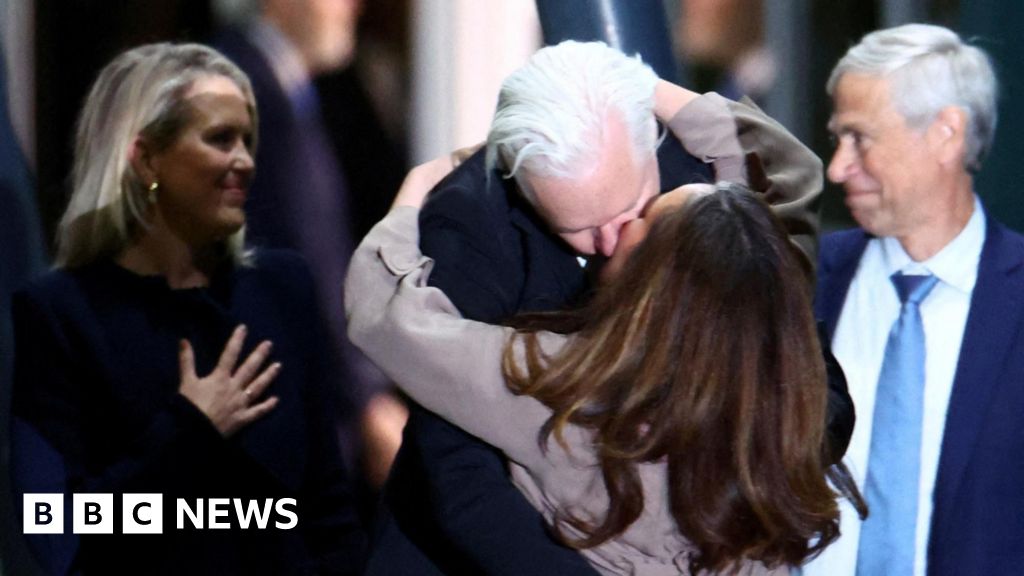Julian Assange has returned to his native Australia after being released from a London jail following a plea deal.
There were emotional scenes at Canberra Airport, with the WikiLeaks founder kissing his wife and hugging his father as his lawyer looked on, visibly moved.
“Julian needs time to recover and adjust to freedom,” Stella Assange said at a press conference shortly after her husband’s arrival.
Assange has been locked in a legal battle for the past 14 years with U.S. officials who accuse him of leaking classified documents, which they say puts lives at risk.
The 52-year-old did not attend the press conference in Canberra, instead letting his lawyer and wife speak for him.
“You have to understand what he went through,” Mrs Assange said, adding that they needed time “for our family to become a family”.
The couple married in 2022 at London’s Belmarsh Prison and have two children.
In a plea agreement, Julian Assange pleaded guilty to one count of conspiracy to obtain and disclose defense information, instead of the 18 charges he initially faced.
The case centers on WikiLeaks’ massive revelations in 2010, when the website published a video from a U.S. military helicopter showing the killing of civilians in the Iraqi capital of Baghdad.
It also released thousands of classified documents showing that U.S. forces killed hundreds of civilians in unreported incidents during the war in Afghanistan.
The revelations became big news, triggering reactions from all corners of the globe and prompting scrutiny of U.S. involvement in foreign conflicts.
Two days after Assange left Belmarsh prison, he formally faced charges in the remote Northern Mariana Islands, a U.S. territory in the Pacific.
In return, he was sentenced to having served his time and was released to fly home.
His lawyer, Jen Robinson, told the outlet the deal was a “criminalization of journalism” and set a “dangerous precedent.”
Ms Assange agreed, saying she hoped the media would “recognize the dangers” of such criminalization because “journalism and the publication of information are in the public interest”.
His lawyers also provided details of phone calls between Assange and Australian Prime Minister Anthony Albanese, who played a major role in securing Assange’s release.
Ms Robinson said Assange told the prime minister he “saved his life”, adding: “I don’t think that’s an exaggeration”.
“It’s a huge victory for Australia to stand up to its allies and demand the return of Australian citizens,” she said.
Mr Albanese held his own press conference on Wednesday, saying he was “very pleased” that the case was over, adding that the WikiLeaks founder had been through “quite an ordeal”.
The Prime Minister has said in the past that he does not agree with everything Assange has done but “enough is enough” and it is time for him to be released, making the case a priority.
Asked whether the plea deal might affect U.S.-Australia relations, he said: “We have a very positive relationship with the United States. I consider President Biden a friend and I think their relationship is absolutely central.”
Assange has spent the past five years in London’s high-security Belmarsh prison, fighting a U.S. attempt to extradite him to face charges of leaking documents.
In 2010, he faced separate charges of rape and sexual assault in Sweden, which he denied. He spent seven years hiding in the Ecuadorian embassy in London, claiming the Swedish case would result in his being sent to the United States.
Swedish authorities dropped the case in 2019, saying it had been a long time since the original complaint.
Swedish women’s rights groups said it was a shame he had never been officially questioned about the rape allegations.
“This is a chapter of shame and betrayal that ends with his release,” Clara Berglund, head of the Swedish Women’s Lobby, told Reuters.
“This is a case that takes place on a major political stage and where male violence against women is incredibly ignored.”

